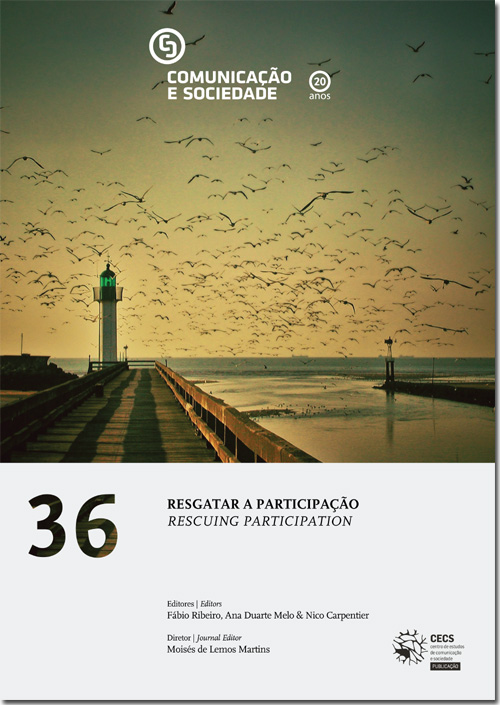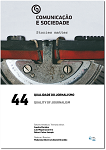Participação num ambiente datificado: questões sobre literacia de dados
DOI:
https://doi.org/10.17231/comsoc.36(2019).2342Palavras-chave:
ativismo, ativismo de dados, datificação, participação, pessoas comuns, tecnopolíticaResumo
No contexto político, entende-se por participação o envolvimento dos cidadãos na tomada de decisões, incluindo mecanismos para que as pessoas intervenham nas escolhas políticas e sociais, entre outras áreas de ação. Esses mecanismos são cruciais, pois a democracia depende da participação cívica na vida política. No entanto, na era do big data, a participação não é possível sem o acesso e controle de dados por parte das pessoas; isto é, os direitos civis tornam-se direitos digitais. Este artigo trata da literacia de dados como um filtro para a participação e do papel das pessoas comuns no ambiente e nos processos de datificação.
Como a participação num mundo datificado depende da capacidade das pessoas de entrar na contenda, questões sobre onde se estabelecem as linhas de separação entre especialistas e não especialistas (ou seja, cidadãos comuns) e se a intervenção na infraestrutura de dados requer um grau de literacia de dados para participação efetiva constituem uma discussão relevante para a prática e teoria do ativismo como uma forma de envolvimento político ou cívico. O envolvimento político é entendido aqui como uma ação coordenada voltada para a resolução de problemas, campanhas e assistência aos cidadãos. Ou seja, para resgatar a participação política num domínio de dados, é necessário um certo grau de capacitação. Partindo de uma taxonomia do envolvimento em data mining (Kennedy, 2016) e casos empíricos de mapeamento de crises (Gutierrez, 2018a, 2018b), este artigo teórico propõe conceptualizações para pensar sobre as implicações da participação na contemporaneidade.
Downloads
Referências
Adelson, R. (2014, 29 de agosto). Nervous about numbers. Retirado de www.psychologicalscience.org/observer/nervous-about-numbers
Alvarez, R. M. & Hall, T. E. (2008). Electronic elections: the perils and promises of digital democracy. Princeton: Princeton University Press.
Arnstein, S. R. (1969). A ladder of citizen participation. Journal of the American Planning Association, 35(4), 216-224.
Association for Computing Machinery (2006). Data mining curriculum: a proposal. Retirado de www.kdd.org/curriculum/index.html
Baack, S. (2015). Datafication and empowerment: how the open data movement re-articulates notions of democracy, participation, and journalism. Big Data & Society, 2(2), 1-11. https://doi.org/10.1177/2053951715594634
Bacon, J. (2009). The art of community: building the new age of participation (theory in practice). Sebastopol: O’Reilly Media, Inc.
Baum, H. S. (2015). Citizen participation. In J. D. Wright, Elsevier international encyclopedia of the Social & Behavioral Sciences (pp. 625-630). Londres: Elsevier.
Beer, D. (2009). Power through the algorithm? Participatory web cultures and the technological unconscious. New Media & Society, 11(6), 985-1002. https://doi.org/10.1177/1461444809336551
Benkler, Y. (2006). The wealth of networks: how social production transforms markets and freedom. New Haven e Londres: Yale University Press.
Carlson, A. (2018, 8 de junho). Good data: challenging the colonial politics of knowledge. Retirado de https://data-activism.net/2018/06/bigdatasur-blog-33-good-data-challenging-the-colonial-politics-of-knowledge/
Castells, M. (2009). Communication power. Oxford: Oxford University Press.
Conselho da Europa. (2017, 27 de setembro). Guidelines for civil participation in political decision making. Retirado de https://rm.coe.int/guidelines-for-civil-participation-in-political-decision-making-en/16807626cf
Conselho de Direitos Humanos. (2014). Factors that impede equal political participation and steps to overcome those challenges. Retirado de https://www.ohchr.org/EN/HRBodies/HRC/RegularSessions/Session27/Documents/A_HRC_27_29_ENG.doc
Couldry, N. (2013). A necessary disenchantment: myth, agency and injustice in a digital world. Retirado de http://www.lse.ac.uk/media@lse/documents/MPP/Nick-Couldrys-LSE-INAUGURAL-SCRIPT.pdf
Couldry, N. & Powell, A. (2014). Big Data from the bottom up. Big Data & Society, 1(2), 1-5. https://doi.org/10.1177/2053951714539277
Cukier, K. & Mayer-Schoenberger, V. (2013). The rise of Big Data: how it’s changing the way we think about the world. Foreign Affairs, 92(3), 28-40.
Dahlberg, L. & Siapera, E. (2007). Radical democracy and the internet: interrogating theory and practice. Nova Iorque: Palgrave Macmillan.
de Soto, P. (2014). Los mapas del #15M: el arte de la cartografía multitud conectada. Retirado de https://tecnopolitica.net/sites/default/files/pablodesoto.pdf
Dodge, M. & Kitchin, R. (2008). Software, objects and home space. Retirado de https://personalpages.manchester.ac.uk/staff/m.dodge/Software_objects_and_home_space.pdf
Feenberg, A. (1999). Questioning technology. Londres e Nova Iorque: Routledge.
Fernández-Martínez, J. L., García-Espín, P. & Jiménez-Sánchez, M. (2019). Participatory frustration: the unintended cultural effect of local democratic innovations. Administration & Society. https://doi.org/10.1177/0095399719833628
Fischer, C. S. (1994). America calling: a social history of the telephone to 1940. Berkeley: University of California Press.
Fox, S. (2015). Apathy, alienation and young people: the political engagement of British millennials. Retirado de http://eprints.nottingham.ac.uk/30532/1/Final%20Corrected%20Version%20-%20Apathy,%20Alienation%20and%20Young%20People%20The%20Political%20Engagement%20of%20British%20Millennials.pdf
Fuchs, C. (2011). Web 2.0, prosumption, and surveillance. Surveillance and Society, 8(3), 288-309. https://doi.org/10.24908/ss.v8i3.4165
Garcia Rey, M. & Garrido, H. (2016). Datos sepultados bajo la ceniza (metodologia). Retirado de http://espanaenllamas.es/datos-sepultados-bajo-la-ceniza-metodologia/
Gray, J., Bounegru, L., Milan, S. & Ciuccarelli, P. (2016). Ways of seeing data: towards a critical literacy for data visualizations as research objects and research devices. In S. Kubitschko & A. Kaun (Eds.), Innovative methods in Media and Communication Research (pp. 290-325). Londres: Palgrave Macmillan.
Gutierrez, M. (2018a). Data activism and social change. Londres: Palgrave Macmillan.
Gutierrez, M. (2018b). Maputopias: cartographies of knowledge, communication and action in the big data society – the cases of Ushahidi and InfoAmazonia. GeoJournal, 84(1), 101-120. https://doi.org/10.1007/s10708-018-9853-8
Gutierrez, M. (2018c). The public sphere in light of data activism. Krisis, 1.
Gutierrez, M. (2019a). Cartographic emotions: how interactive maps mobilize people in geoactivism. In N. M. Engebretsen & H. Kennedy (Eds.), Data Visualization in Society. Amesterdão: Universidade de Amesterdão.
Gutierrez, M. (2019b). The good, the bad and the beauty of “Good enough data”. In A. Daly, K. Devitt & M. Mann (Eds.), Good data: theory on demand, 29 (pp. 54-76). Amesterdão: Institute of Network Cultures. Retirado de http://ceem.unsw.edu.au/sites/default/files/documents/An%20Energy%20Data%20Manifesto%20-%20Chapter.pdf
Habermas, J. (1991). The structural transformation of the public sphere: an inquiry into a category of bourgeois society. Cambridge: The MIT Press.
Hearn, A. (2008). “Meat, Mask, Burden”: probing the contours of the branded “self”. Journal of Consumer Culture, 8(2), 197-217. https://doi.org/10.1177/1469540508090086
Hintz, A., Dencik, L. & Wahl-Jorgensen, K. (2017). Digital citizenship and surveillance society. International Journal of Communication, 11, 731-739.
Kekic, L. (2007). The Economist Intelligence Unit’s index of democracy. Retirado de http://www.economist.com/media/pdf/DEMOCRACY_INDEX_2007_v3.pdf
Kennedy, H. (2016). Post, mine, repeat: social media data mining becomes ordinary. Londres: Palgrave Macmillan.
Kennedy, H. & Hill, R. (2017). The feeling of numbers: emotions in everyday engagements with data and their visualisation. Sociology, 52(4), 830-848. https://doi.org/10.1177/0038038516674675
Kurban, C., Peña-Lopez, I. & Haberer, M. (2016). What is technopolitics? A conceptual scheme for understanding politics in the digital age. In Atas da 12ª Conferência Internacional Internet, Law & Politics, Barcelona. Retirado de http://ictlogy.net/presentations/20160707_can_kurban_ismael_pena-lopez_maria_haberer_-_what_is_technopolitics_conceptual_scheme.pdf
Lash, S. (2007). Power after hegemony: Cultural Studies in mutation? Theory, Culture & Society, 24(55), 55-78. https://doi.org/10.1177/0263276407075956
McCarthy, A. (2008). From the ordinary to the concrete: Cultural Studies and the politics of scale. In M. White & J. Schwoch (Eds.), Questions of method in Cultural Studies (pp. 21-53). Oxford: Wiley Blackwell.
Milan, S. (2013). Social movements and their technologies: wiring social change. Hampshire e Nova Iorque: Palgrave Macmillan.
Milan, S. (2015). Liberated technology: inside emancipatory communication activism. In E. Gordon & P. Mihailidis (Eds.), Civic media: technology, design, practice (pp. 107-124). Massachusetts: The MIT Press.
Milan, S. & Gutierrez, M. (2015). Citizens’ media meets Big Data: the emergence of data activism. Mediaciones, 14, 120-130.
Mossberger, K., Tolbert, C. J. & McNeal, R. S. (2008). Digital citizenship: the internet, society, and participation. Cambridge: MIT Press.
Naik, R. (2017, 3 de outubro). Let’s take back control of our data – it’s too precious to leave to the tech giants. Retirado de https://www.theguardian.com/commentisfree/2017/oct/03/data-tech-giants-trail-digital-age
Papacharissi, Z. (2019). The virtual sphere: the internet as a public sphere. In M. Stempfhuber & E. Wagner (Eds.), Praktiken der Überwachten (pp. 43-60). Würzburg: Springer VS. https://link.springer.com/book/10.1007%2F978-3-658-11719-1
Puschmann, C. & Burgess, J. (2013). The politics of Twitter data. HIIG Discussion Paper Series, 2013-01. https://doi.org/10.2139/ssrn.2206225
Pybus, J., Cote, M. & Blanke, T. (2015). Hacking the social life of Big Data. Big Data & Society, 2(2). https://doi.org/10.1177/2053951715616649
Quintanilha, T. (2018). A contribution to the debate on the redefinition of the networked public sphere based on Portuguese public participation in cyberspace. Comunicação e Sociedade, 34, 287-304. https://doi.org/10.17231/comsoc.34(2018).2950
Radjawali, I. & Pye, O. (2015). Counter-mapping land grabs with community drones in Indonesia – land grabbing, conflict and agrarian-environmental transformations: perspectives from East and Southeast Asia. Comunicação apresentada na International Academic Conference, Chiang. Retirado de http://www.iss.nl/fileadmin/ASSETS/iss/Research_and_projects/Research_networks/LDPI/CMCP_80-Radjawali_and_Pye.pdf
Ruppert, E., Isin, E. & Bigo, D. (2017). Data politics. Big Data & Society, 4(2), 1-7. https://doi.org/10.1177/2053951717717749
Sampedro, V. (2011). Públicos y recursos tecnopolíticos: minorías insatisfechas y diques a la participación. In V. Blanco (Ed.), Cibercampaña: cauces y diques para la participación (pp. 11-39). Madrid: UCM Editorial Complutense.
Sampedro, V. (2014). El cuarto poder en red. Barcelona: Icaria.
Sampedro, V. (2018). Dietética digital: para adelgazar al gran hermano. Madrid: Icaria.
Sanborn, H. (2017). Broken back? Efficacy and participation in Asia’s democracies. Asian Journal of Comparative Politics, 3(1), 13-24. https://doi.org/10.1177/2057891117699091
Schudson, M. (1998). Changing concepts of democracy. Comunicação apresentada na Conferência “Democracy and Digital Media”, Massachusetts. Retirado de http://web.mit.edu/m-i-t/articles/schudson.html
Simonite, T. (2018, 17 de agosto). AI is the future – but where are the women? Retirado de https://www.wired.com/story/artificial-intelligence-researchers-gender-imbalance/
Striphas, T. (2015). Algorithmic culture. European Journal of Cultural Studies, 18(4-5), 395-412.
Thomas, S. (2018). Democratic deficits and digital compensation: the digital promises revisited. In T. Joseph & S. Joseph (Eds.), Deliberative democracy. Understanding the Indian experience (pp. 142-159). Londres: Routledge. https://doi.org/10.4324/9780429486340
Tufekci, Z. (2014). Engineering the public: internet, surveillance and computational politics. First Monday, 19(7). https://doi.org/10.5210/fm.v19i7.4901
Turkoglu, N. (2011). Mediated public voices need theory to be heard. Management Communication Quarterly, 21, 141-158.
Uldam, J. & Vestergaard (Eds.) (2015). Civic engagement and social media: political participation beyond protest. Londres: Palgrave Macmillan UK.
van Dijck, J. (2014). Datafication, dataism and dataveillance: Big Data between scientific paradigm and ideology. Surveillance & Society, 12(2), 197-208.
Wachter-Boettcher, S. (2017). Technically wrong: sexist apps, biased algorithms and other threats of toxic tech. Nova Iorque: Norton & Company.
Wissenbach, K. (2019). Accounting for power in transnational civic tech activism: A communication-based analytical framework for media practice. The International Communication Gazette, Online First. https://doi.org/10.1177/1748048519832779
Whittaker, M. et al. (2018). AI now report 2018. Retirado de https://ainowinstitute.org/AI_Now_2018_Report.pdf
Zukin, C., Keeter, S., Andolina, M., Jenkins, K. & delli Carpini, M. X. (2006). A new engagement?: political participation, civic life, and the changing American citizen. Oxford: Oxford University Press.
Downloads
Publicado
Como Citar
Edição
Secção
Licença
Os autores são titulares dos direitos de autor, concedendo à revista o direito de primeira publicação. O trabalho é licenciado com uma Licença Creative Commons - Atribuição 4.0 Internacional.














